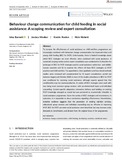| dc.contributor.author | Barnett, Inka | |
| dc.contributor.author | Meeker, Jessica | |
| dc.contributor.author | Roelen, Keetie | |
| dc.contributor.author | Nisbett, Nick | |
| dc.date.accessioned | 2022-07-14T14:53:30Z | |
| dc.date.available | 2022-07-14T14:53:30Z | |
| dc.date.issued | 2022-05-03 | |
| dc.identifier.citation | Barnett, I.; Meeker, J.; Roelen, K. and Nisbett, N. (2022) 'Behaviour Change Communication for Child Feeding in Social Assistance: A Scoping Review and Expert Consultation', Maternal & Child Nutrition 18.3, DOI: 10.1111/mcn.13361 | en |
| dc.identifier.uri | https://opendocs.ids.ac.uk/opendocs/handle/20.500.12413/17530 | |
| dc.description.abstract | To increase the effectiveness of social assistance on child nutrition, programmes are increasingly combined with behaviour change communication for improved infant and young child feeding (BCC for IYCF). Unfortunately, there is limited knowledge about which BCC strategies are most effective when combined with social assistance. A systematic scoping review and an expert consultation was conducted to (1) describe the landscape of BCC for IYCF strategies used in social assistance within low- and middle-income countries and (2) to examine the effects of these BCC strategies on IYCF practices and child nutrition. Ten quantitative, three qualitative and four mixed methods studies were reviewed and complemented by 12 expert consultations carried out between August and October 2020. In most of the studies attendance in BCC for IYCF was conditional for receiving social assistance, although experts agreed that this conditionality may be counterproductive. A variety of BCC strategies were used with two being most common—group sessions with pre-determined topics and individual counselling. Context-specific adaptation, interactive delivery and building on existing IYCF knowledge emerged as crucial but was perceived as economically infeasible in social assistance programmes. Given the variety of BCC strategies and inconsistency in outcomes, it is impossible to draw conclusions regarding effectiveness. Nevertheless, tentative evidence suggests that the promotion of existing nutrition services, educational group sessions and individual counselling may be effective in improving IYCF. BCC for IYCF can make social assistance more beneficial, but may increase costs, demands on beneficiaries, and deviate from the original focus of the programmes. | en |
| dc.description.sponsorship | Irish Aid | en |
| dc.language.iso | en | en |
| dc.publisher | Wiley Online Library | en |
| dc.relation.ispartofseries | Maternal & Child Nutrition;18.3 | |
| dc.rights.uri | http://creativecommons.org/licenses/by-nc/4.0/ | en |
| dc.subject | Children and Youth | en |
| dc.title | Behaviour Change Communication for Child Feeding in Social Assistance: A Scoping Review and Expert Consultation | en |
| dc.type | Article | en |
| dc.rights.holder | © 2022 The Authors | en |
| dc.identifier.externaluri | https://doi.org/10.1111/mcn.13361 | en |
| dc.identifier.team | Health and Nutrition | en |
| dc.identifier.doi | 10.1111/mcn.13361 | |
| rioxxterms.funder | Default funder | en |
| rioxxterms.identifier.project | Default project | en |
| rioxxterms.version | NA | en |
| rioxxterms.versionofrecord | 10.1111/mcn.13361 | en |
| rioxxterms.funder.project | 9ce4e4dc-26e9-4d78-96e9-15e4dcac0642 | en |


